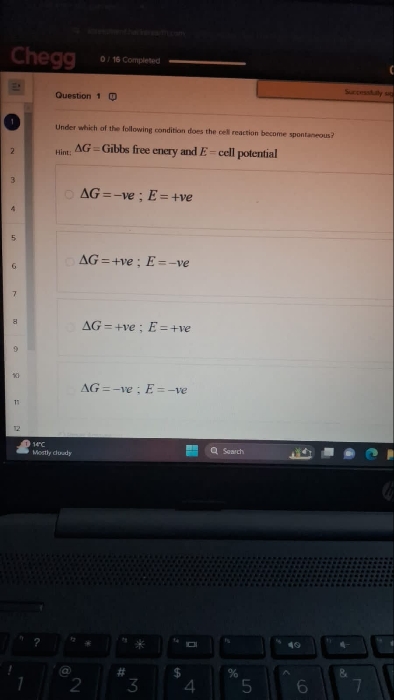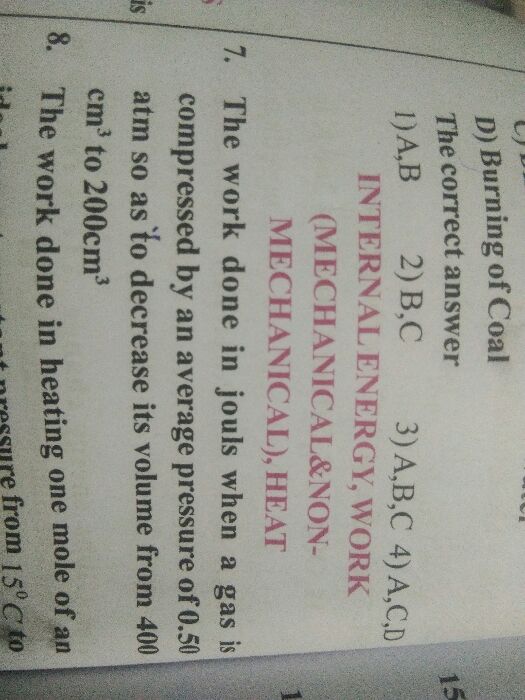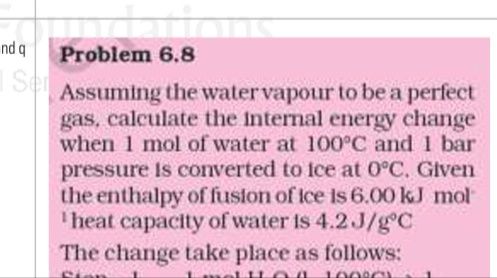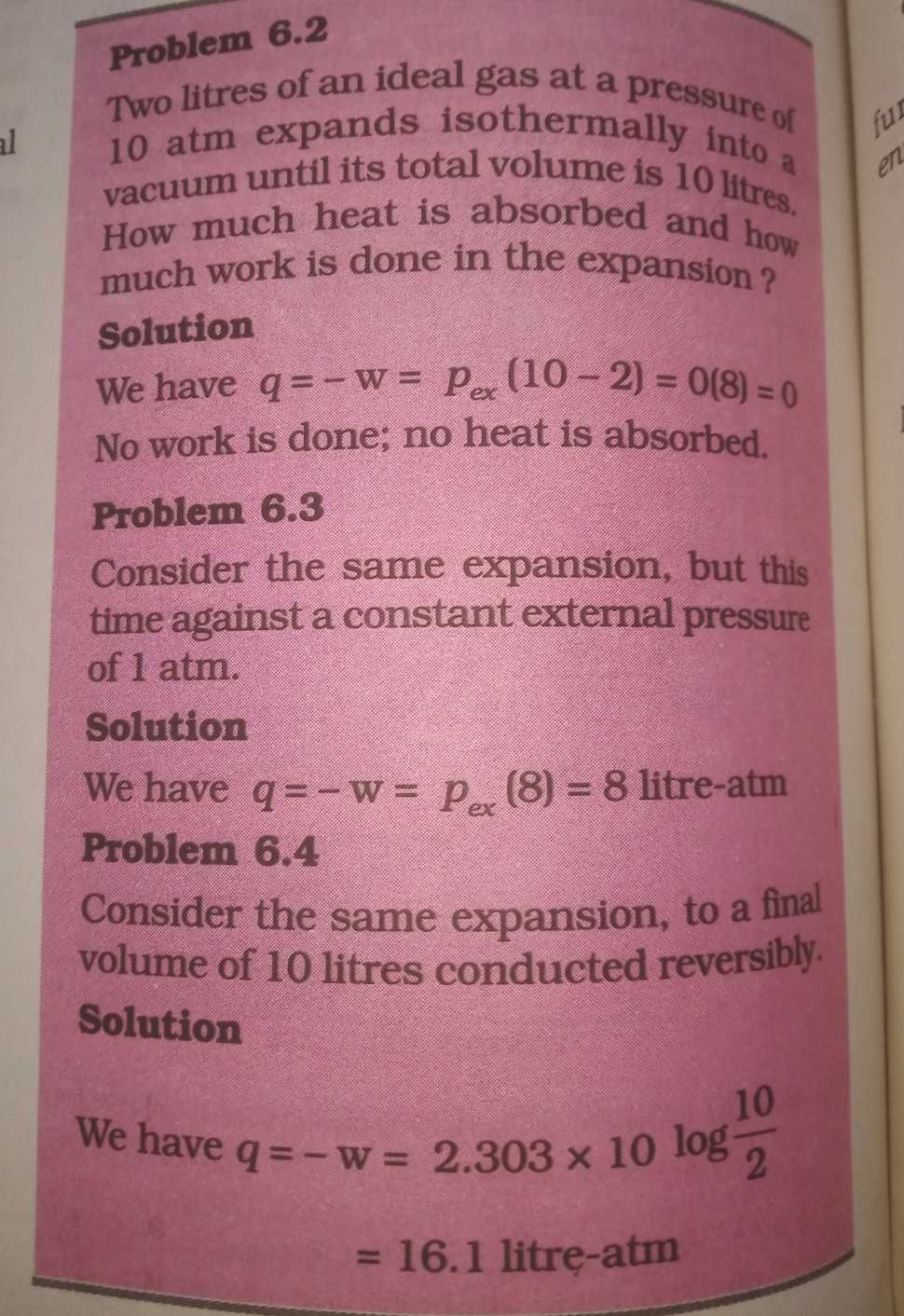Chemical Thermodynamics
Chemical Thermodynamics PDF Notes, Important Questions and Synopsis
SYNOPSIS
- Thermodynamics is a branch of Chemistry which deals with the exchange in heat energy during chemical and physical changes.
-
System: It is a part of the universe which is under thermodynamic consideration.
-
Open system: Continuous exchange of heat energy and matter takes place together.
-
Closed system: Continuous exchange of energy takes place, but matter remains constant.
-
Isolated system: There is neither exchange of energy nor matter.
-
Surroundings: It constitutes the biotic and abiotic factors which affect the physical and chemical properties of the system.
-
Intensive properties: These are properties which do not depend on the quantity of matter present in the system such as pressure, temperature, specific heat, refractive index, surface tension, viscosity, and boiling and melting points.
-
Extensive properties: These are properties which depend on the quantity of matter present in the system such as volume, mass, energy, enthalpy and entropy.
-
State function: Any property of the system which defines the state of the system but is independent of the path which brings about the change in state is known as a state function.
For example, pressure, volume, temperature, moles, mass, enthalpy, internal energy, entropy and Gibb’s free energy. -
Path functions: Path functions are properties whose values depend on transition of the system from the initial state to the final state.
For example, work and heat. - Thermodynamic processes:
- Isothermal process: T = Constant
dT = 0
∆T = 0 - Isochoric process: V = Constant
dV = 0
∆V = 0 - Isobaric process: P = Constant
dP = 0
∆P = 0 - Adiabatic process: q = 0
Heat exchange with the surrounding = 0 (zero)
- Isothermal process: T = Constant
- Cyclic process: In these processes, the initial and final states are identical.
- Reversible process: Processes in which the energy change in each step can be reversed in direction by making an infinitesimally small change in any property of the system.
- Irreversible process: Processes in which the system or surroundings is not restored to its initial state at the end of the process.
- Zeroth law of thermodynamics: If two bodies are in thermal equilibrium with some third body, then they may also be in equilibrium with each other.
-
IUPAC sign convention for heat and work:
Work done by the system = Positive
Work done on the system = Negative -
First law of thermodynamics: Energy can neither be created nor be destroyed but can be transferred from one form to another.
-
Enthalpy: When the system is under conditions of constant pressure, the energy of the system is called enthalpy.
-
Factors affecting enthalpy of a reaction:
- Allotropic forms of the elements used
- Physical state of reactants and products
- Temperature and pressure
-
Second law of thermodynamics:
Total energy of an isolated system can never decrease over time. -
Heat capacity: It is the capacity of heat required to raise the temperature of a system by one degree.
-
Calorimetry: It is the technique of measuring the amount of heat absorbed or evolved during a chemical reaction or physical change.
-
Exothermic reaction: These are reactions in which heat is evolved.
-
Endothermic reaction: These are reactions in which heat is absorbed.
-
Enthalpy of reaction: The amount of heat absorbed or evolved in the reaction.
-
Third law of thermodynamics: The entropy of perfect crystals of all pure elements and compounds is zero at absolute zero temperature.
-
Gibb’s free energy (G): (State function and an extensive property)
Gsystem = H system - TS system -
Criteria of spontaneity:
If ∆G system is (-ve) < 0 ⇒ process is spontaneous
If ∆Gsystem is (+) > 0 ⇒ process is non-spontaneous
If ∆Gsystem = 0 ⇒ system is at equilibrium -
Standard enthalpy of reaction: The heat change for a reaction taking place at standard conditions of temperature and pressure, that is, 298 K and 1 bar, is called standard heat of reaction.
-
Enthalpy of formation: The amount of heat evolved or absorbed when one mole of substance is formed from its constituent elements.
-
Enthalpy of combustion: It is the enthalpy change when one mole of the substance is completely burnt in excess of air.
-
Enthalpy of neutralisation: The amount of heat evolved when one gram equivalent of an acid is neutralised by one gram equivalent base.
-
Enthalpy of solution: The amount of heat evolved or absorbed when the given quantity of solute is dissolved in a large quantity of solvent at constant pressure.
-
Enthalpy of atomisation: The amount of heat absorbed by one mole of substance to get converted to individual atoms in the gaseous state by breaking all chemical bonds.
-
Enthalpy of hydration: The amount of heat evolved when a given quantity of anhydrous salt absorbs sufficient amount of solvent to form a hydrated salt.
-
Enthalpy of vaporisation: The amount of heat absorbed when one mole of a liquid substance gets converted to the vapour state at its boiling point.
-
Enthalpy of sublimation: The amount of heat absorbed when one mole of solid substance gets converted to gaseous state at constant temperature and pressure.
-
Enthalpy of condensation: The amount of heat evolved when one mole of a gaseous substance gets condensed to the liquid state.
-
Enthalpy of fusion: The amount of heat absorbed in converting one mole of liquid to a solid at its melting point.
-
Lattice enthalpy: It is the energy required to completely separate the ions in one mole of a solid compound from each other to form a cloud of gaseous ions.
-
Hess’s law: The sum of heat changes during a chemical reaction is constant irrespective of the path it follows.
Related Chapters
- Some Basic Concepts in Chemistry
- States of Matter
- Atomic Structure
- Chemical Bonding and Molecular Structure
- Solid State
- Solutions
- Equilibrium
- Redox Reactions and Electrochemistry
- Chemical Kinetics
- Surface Chemistry
- Classification of Elements and Periodicity in Properties
- General Principles and Processes of Isolation of Metals
- Hydrogen
- s-Block Element (Alkali and Alkaline Earth Metals)
- p-Block Elements
- d - and f - Block Elements
- Co-ordination Compounds
- Environmental Chemistry
- Purification and Characterisation of Organic Compounds
- Some Basic Principles of Organic Chemistry
- Hydrocarbons
- Organic Compounds Containing Halogens
- Organic Compounds Containing Oxygen
- Organic Compounds Containing Nitrogen
- Polymers
- Biomolecules
- Chemistry in Everyday Life
- Principles Related to Practical Chemistry







